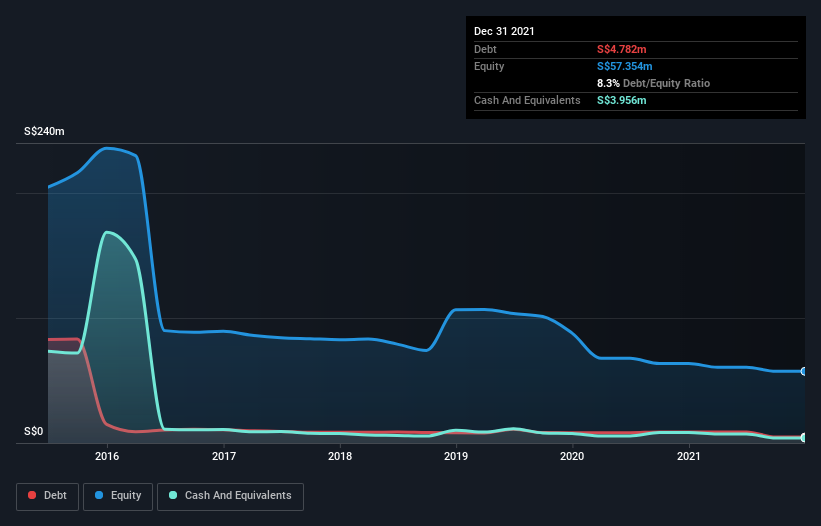Warren Buffett famously said, 'Volatility is far from synonymous with risk.' It's only natural to consider a company's balance sheet when you examine how risky it is, since debt is often involved when a business collapses. We can see that IPC Corporation Ltd (SGX:AZA) does use debt in its business. But should shareholders be worried about its use of debt?
What Risk Does Debt Bring?
Debt is a tool to help businesses grow, but if a business is incapable of paying off its lenders, then it exists at their mercy. If things get really bad, the lenders can take control of the business. However, a more common (but still painful) scenario is that it has to raise new equity capital at a low price, thus permanently diluting shareholders. Of course, debt can be an important tool in businesses, particularly capital heavy businesses. The first step when considering a company's debt levels is to consider its cash and debt together.
Check out our latest analysis for IPC
What Is IPC's Debt?
As you can see below, IPC had S$4.78m of debt at December 2021, down from S$8.86m a year prior. However, it does have S$3.96m in cash offsetting this, leading to net debt of about S$826.0k.

How Strong Is IPC's Balance Sheet?
We can see from the most recent balance sheet that IPC had liabilities of S$3.60m falling due within a year, and liabilities of S$4.23m due beyond that. On the other hand, it had cash of S$3.96m and S$99.0k worth of receivables due within a year. So it has liabilities totalling S$3.78m more than its cash and near-term receivables, combined.
While this might seem like a lot, it is not so bad since IPC has a market capitalization of S$9.38m, and so it could probably strengthen its balance sheet by raising capital if it needed to. But it's clear that we should definitely closely examine whether it can manage its debt without dilution. There's no doubt that we learn most about debt from the balance sheet. But you can't view debt in total isolation; since IPC will need earnings to service that debt. So when considering debt, it's definitely worth looking at the earnings trend. Click here for an interactive snapshot.
Over 12 months, IPC made a loss at the EBIT level, and saw its revenue drop to S$4.2m, which is a fall of 23%. That makes us nervous, to say the least.
Caveat Emptor
While IPC's falling revenue is about as heartwarming as a wet blanket, arguably its earnings before interest and tax (EBIT) loss is even less appealing. Indeed, it lost a very considerable S$5.8m at the EBIT level. Considering that alongside the liabilities mentioned above does not give us much confidence that company should be using so much debt. Quite frankly we think the balance sheet is far from match-fit, although it could be improved with time. However, it doesn't help that it burned through S$553k of cash over the last year. So suffice it to say we consider the stock very risky. The balance sheet is clearly the area to focus on when you are analysing debt. However, not all investment risk resides within the balance sheet - far from it. Be aware that IPC is showing 4 warning signs in our investment analysis , and 2 of those can't be ignored...
At the end of the day, it's often better to focus on companies that are free from net debt. You can access our special list of such companies (all with a track record of profit growth). It's free.
New: AI Stock Screener & Alerts
Our new AI Stock Screener scans the market every day to uncover opportunities.
• Dividend Powerhouses (3%+ Yield)
• Undervalued Small Caps with Insider Buying
• High growth Tech and AI Companies
Or build your own from over 50 metrics.
Have feedback on this article? Concerned about the content? Get in touch with us directly. Alternatively, email editorial-team (at) simplywallst.com.
This article by Simply Wall St is general in nature. We provide commentary based on historical data and analyst forecasts only using an unbiased methodology and our articles are not intended to be financial advice. It does not constitute a recommendation to buy or sell any stock, and does not take account of your objectives, or your financial situation. We aim to bring you long-term focused analysis driven by fundamental data. Note that our analysis may not factor in the latest price-sensitive company announcements or qualitative material. Simply Wall St has no position in any stocks mentioned.
About SGX:AZA
IPC
An investment holding company, engages in property development and investment activities in Singapore, Japan, and China.
Slight risk with mediocre balance sheet.
Market Insights
Community Narratives



